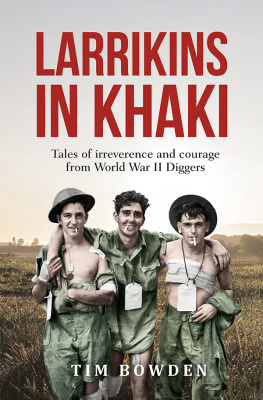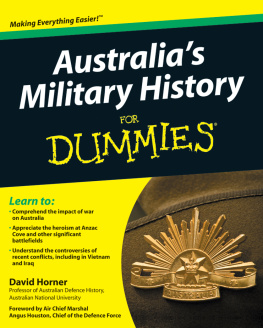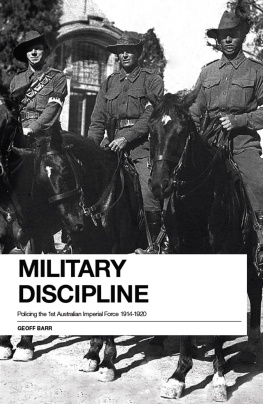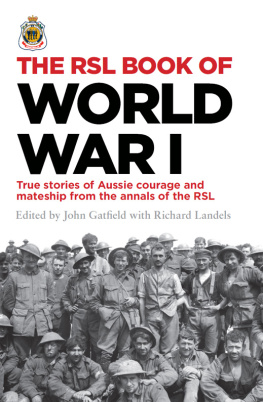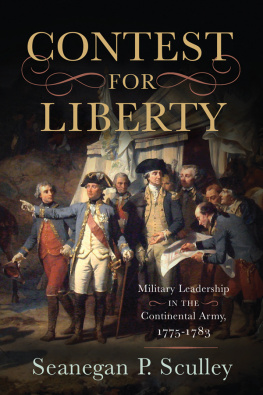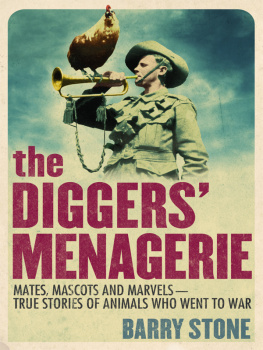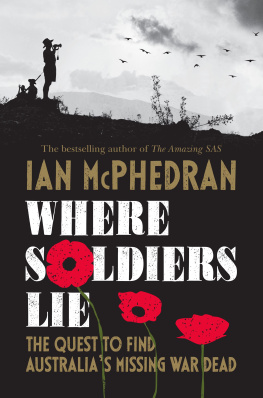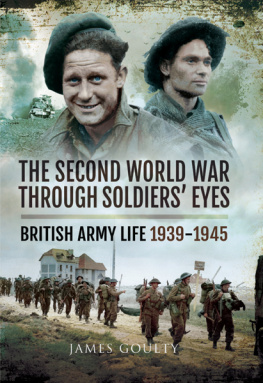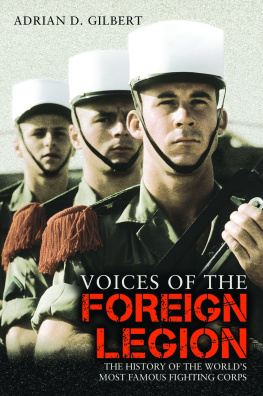Every effort has been made to trace the holders of copyright material. If you have any information concerning copyright material in this book please contact the publishers at the address below.
Copyright Tim Bowden 2019
All rights reserved. No part of this book may be reproduced or transmitted in any form or by any means, electronic or mechanical, including photocopying, recording or by any information storage and retrieval system, without prior permission in writing from the publisher. The Australian Copyright Act 1968 (the Act) allows a maximum of one chapter or 10 per cent of this book, whichever is the greater, to be photocopied by any educational institution for its educational purposes provided that the educational institution (or body that administers it) has given a remuneration notice to the Copyright Agency (Australia) under the Act.
Allen & Unwin
83 Alexander Street
Crows Nest NSW 2065
Australia
Phone: (61 2) 8425 0100
Email:
Web: www.allenandunwin.com

ISBN 978 1 76052 854 6
eISBN 978 1 76087 160 4
Set by Midland Typesetters, Australia
Cover designer: Julia Eim
Cover photographer: Australia War Memorial image number 013857 and Getty Images (Michael F. Bodin/EyeEm)
For Hank Nelson and Peter Stanley
CONTENTS


There is a possibly apocryphal story told of two Aussie Diggers experience in the trenches of World War I. General William Birdwood, an Englishman, commanded the ANZAC Corps, and by mid 1916 the Anzacs were in action on the Somme. You can imagine the trenches, churned mud, duckboards and shell-holed no-mans land. Two Diggers are leaning against the side of a trench, smoking and holding their .303 rifles in one hand. They watch a senior British officer followed by a gaggle of attendant junior officers pick their way briskly along a front-line trench. The Diggers dont take their eyes off the officers, but they dont shift to allow a wider passage and they dont salute. After the senior officer has passed, a junior officer spins around and comes back. He says, Dont you know who that was? The Diggers consider the question. One answers: Nope. You ever met him Barney? Nah, not me. Junior officer: That was General Birdwood! The first Digger says, Well he didnt have feathers on his arse like any other bird would.
General Birdwood was one of the better English generals. At least he was in the trenches seeing for himself what was going on.
While the Diggers fighting abilities were respected, the British found the Australian soldiers hard to take. Their relaxed attitude to military discipline and niceties like saluting officers was not appreciated. It has been ever thus, continuing on to World War II.
My late friend, historian Professor Hank Nelson, who collaborated with me in a major oral history radio series, Prisoners of War: Australians Under Nippon first broadcast on the ABC in 1984, delighted in collecting self-published books by Australian Diggers. These often larrikin accounts contained vivid descriptions of the fighting they shared in the Middle East, South-east Asia, New Guinea and the Pacific Islands, but also equally colourful descriptions of the rackets, skulduggery, drunken escapades in brothels, hatred and loathing of military police as well as less than flattering portraits of the officers they did not respect in and out of combat.
I shared this interest and also started a modest collection of similar frank and forthright narratives. We had discussed the possibility of collaborating on a book based on these accounts. Shortly before Hanks untimely death in February 2012, I was in Canberra for what we both realised was almost certainly our last meeting. He made a point of handing over to me the self-published books he had in his library. I have now had to fly solo.
This is not in any sense a military history of the Australian armys involvement in World War II. While many of the major theatres are featuredPalestine, North Africa, Greece and Crete, Malaya, Java, Thailand and Burma, Borneo, Papua New Guinea and the Pacific Islands occupied by the Japanese, there is no mention of Australian involvement in Timor, Ambon, Hainan or the infamous Death Marches in Borneo, for example. This is because the Australian Diggers who feature in this book control the narrative, depending on where they were and what happened to them. Here are their highly individual storieswarts and all.
Tim Bowden

| Section | (about 10 men) |
| Platoon | (about 30) |
| Company | (150200) |
| Battalion | (up to 1000) |
| Brigade | (3 battalions) |
| Division | (3 brigades) |

Australias longest-serving prime minister Robert Menzies once famously opined that Australians were British to the boot-straps. How many Australians wore boot-straps or even knew what they were is unclear, but it was a graphic illustration of Australias dependence on the Mother Country particularly when the British Empires interests were threatened by war. Until well into the twentieth century, it was the only foreign policy Australia had. However, the Commonwealth government had strongly supported the British governments policy of appeasing Hitler when, in September 1938, he incorporated the Sudetenland province of western Czechoslovakia into the Reich. But Australia was equally ready to reverse that policy when Britain changed tack, and in March and April 1939 guaranteed support for Poland, Greece and Romania in the event of German or Italian aggression.
Australias loyalty became strongly affirmed on 3 September 1939 when Prime Minister Menzies sonorous tones were heard on the radio, saying: It is my melancholy duty to inform you officially that, in consequence of a persistence by Germany in her invasion of Poland, Great Britain has declared war upon her and that, as a result, Australia is also at war.
Clearly an expanded army would have to be recruitedand quickly. One problem flowed from the so-called two-army system. There was the Australian Imperial Force (AIF), an elite expeditionary force composed entirely of men who had volunteered to fight anywhere in the world. Then there was the Australian Militia, whose service was limited to Australia and its territories. In October 1939 Cabinet decided to reintroduce conscription, last in existence in 1929. It was hoped to have a part-volunteer, part-conscript Militia of some 75,000, calling up those with trades or skills that were needed. This dual system had some unhappy consequences as the war went on, with the derogatory term Chocos (Chocolate Soldiers) for those in the Militia, or conscripts. Many officers in the regular army would have preferred one army which could have been used wherever the national interest dictated. But opposition to the conscription of men to fight overseas, because of the divisive referenda in the Great War, was too deeply entrenched for this to be politically possible.
This rivalry manifested itself very early, even in the training period. Ingleburn camp was still being constructed in Sydney, as AIF recruit Bob Hooker Holt later wrote:

